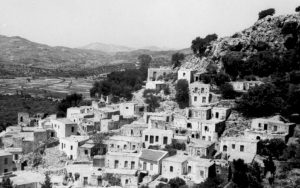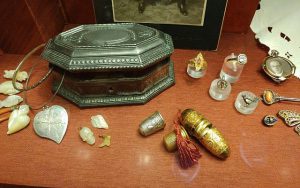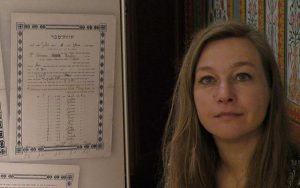
Seventy-five years ago this month, in May 1944, the Nazis rounded up the entire Jewish population of Crete and forced them onto a tanker ship called the Tanais. The Nazis planned to bring the Jews to Auschwitz but on June 9, as the ship approached the port of Piraeus, the commander of a British submarine spotted what he assumed was a German military vessel and ordered the firing of four torpedoes. The Tanais sank and all aboard drowned, ending the existence of a Jewish community that had lived in Crete uninterruptedly for 2300 years.
A new exhibit at the Jewish Museum of Greece in Athens commemorates the history of that community through artifacts gathered from Jewish families who left Crete before the war.

“My mother luckily moved in the nineteen thirties to Athens where she and my father were hidden by Greek friends ,” says Dona-Lilian Kapon, whose family heirlooms include centuries-old Jewish ritual objects handed down by her grandparents.

Among the exhibit’s most poignant relics are the notebooks of Jewish children safeguarded by Christian neighbours. “When the children were told that they had to go away, they were worried that they would lose their school books so they gave them to friends,” explains Christina Meri, the museum curator.

Several months after the deportation, Katina Syngelaki, described the departure of her Jewish friends:
“My good schoolmate, completely devastated, is giving me instructions: ‘Dear Katina, save my school books!’…One after the other, our neighbours were leaving. ..An old respectable woman who was blind was forced to move on as quickly as possible, obeying the orders of the barbaric invaders…
When the sun rose, the neighbourhood was completely empty of people. Outside the house entrances of those unfortunate people stood the beasts of a European country… Looking now at the books which escaped destruction, my eyes in tears, I promise to always keep them in memory of my good schoolmate who tried so hard to become better and better in her studies… Eight days later, a number of cars parked at a small distance, to empty the synagogue of its valuables… Oh, they were Greeks, our brothers, whose sons fought by our sides…

The exhibit, launched just before the 75th anniversary of the sinking of the Tanais, comes at a time when the German occupation has once again become a controversial subject in Greece.
“With the Greek elections approaching (in October) the Greek demand for reparations for the Nazi occupation is the one topic that most Greeks agree on,” says Valentin Schneider, a German historian living in Athens.
Schneider points out that the Germans originally argued that because the occupation was committed by a united Germany it was too early to make claims. “Then after German reunification they said it was too late,” he notes, adding that Greece’s own preoccupation with its civil war during the critical years after the Second World War also hindered the country’s ability to confront Germany with a unified voice.
In 2010 the issue came to the forefront during the Greek financial crisis when the Greeks tried to justify their request for German help as compensation for wartime German looting and for funds taken from Greek banks in order to pay for German war expenses.
Although the Germans did consent to participate in a Eurozone bailout package for Greece, they were adamant in separating the issue from war claims.
One way in which the German government has however acknowledged Nazi activities in Greece, suggests Schneider, is by funding research and educational efforts. .
Schneider currently is conducting a German-funded research project aimed at creating a database detailing the undertakings of German troops stationed in Greece.
Another German-funded endeavor is the Memories of the Occupation in Greece project which was coordinated by Prof. Hagen Fleischer of the University of Athens. Over the course of three years Fleischer’s team interviewed about 100 Greek witnesses of the German occupation in order to create a website with videotaped testimonies.
German-born Fleischer who previously worked at the University of Crete notes that in addition to the Tanais casualties, a number of Cretan Jews were killed in 1942 during their participation in an attempt by the Greek resistance movement to sabotage the Heraklion airfield.
Fleischer also has researched the Greek claims for German compensation, and several years ago uncovered a document compiled by German economists just before the end of the war in which they calculated that the German debt to the Greek state would be the equivalent of 476 million Reichsmarks, the equivalent of more than 10 billion Euro today.
“But German leaders tremble when the subject of reparations comes up because they are afraid of setting a precedent,” says Fleischer. “Next in line will be Poland and then Belarus and then there will be claims for the German genocide of the Herero and Nama peoples of South West Africa in 1904,” adds Fleischer.
While working at the University of Crete in the 1980s, Fleischer recalls that he unsuccessfully appealed to the German government to pay for the rehabilitation of a decaying synagogue in the Cretan town of Chania.
It was not until 1996 that a group of Greek Jews undertook the reconstruction of the Etz Hayim synagogue. Today there are once again weekly services for members of the small and growing number of Jews who have returned to live in Crete.
Bernard Dichek
.
https://www.timesofisrael.com/greek-jews-honor-crete-community-drowned-in-entirety-en-route-to-auschwitz/
